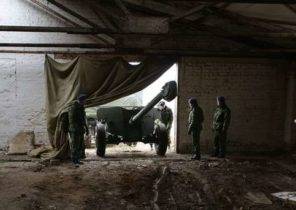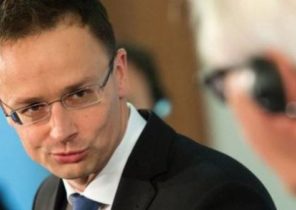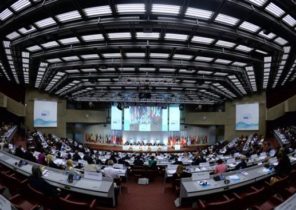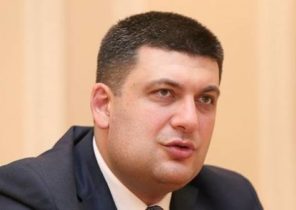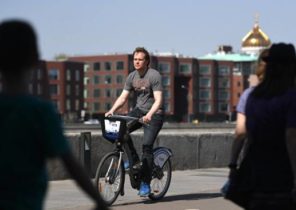
The lack of unity regarding the requirements for the ceasefire inspires distrust and plunges the residents of Eastern Ukraine in despair. But why world leaders can not agree? Why the negotiations did not take place, tried to find out the journalists of the Swedish newspaper Fria Tidningar.
We pass the checkpoint “Stalingrad” in an effort to get to the small village of Stanytsia Luhanska, located two kilometers from the Russian border in the Luhansk region. This checkpoint is so called because for the last two years many times it was attacked by the separatists, supported by Russia. We see on the way towards the front riding tanks and heavily armed Ukrainian soldiers. First impression says that a ceasefire in Eastern Ukraine. In the Village the Ukrainian military and the separatists are watching each other all day and night, while people indicate that fighting was going on yesterday. Nobody understands why is it so difficult to agree on a cease-fire, when the people do not so much wish as world.
To understand why Russia and Ukraine can not agree, you need to rewind time back to February 2015, when in Minsk, capital of Belarus, discussed the Second Minsk agreement. It was the last time the cease-fire has indeed been achieved. On paper. The document, consisting of 13 items included, including the withdrawal of troops and weapons from the front line, exchange of prisoners and Amnesty for the separatists in Ukraine. But perhaps the most important part of the Treaty concerned local elections in the region controlled by the separatists, to residents of Donbass were able to get some sort of government- special status for the region. Then they could, for example, themselves to elect the judge and the Prosecutor. A necessary condition called the presence at the elections of the Organization for security and cooperation in Europe (OSCE), which was to be able to move freely in the Donbass to monitor elections and to act as a guarantor of security.
According to estimates more than 9 600 people died as a result of this war, and the battles never ceased. About a week ago has been regular talks between the countries of the so-called “Channel four” (namely, the leaders of Ukraine, Russia, Germany and France), to try to reach agreement on the conditions under which the action can join the cease-fire. But the meeting ended as before, and the only contention that was presented at the subsequent press conference is a vague “road map” with the main lines according to which the warring parties could move away from the front, with the aim to improve the humanitarian situation in the region. So far there is no indication that a plan is performed and, according to the observations of the OSCE, in recent weeks the situation, on the contrary, escalated. Both sides seem further apart than ever.
But why did the negotiations fail? The main reason is that there are two completely different ideas about war and reality. Russia denies its presence in the region and this complicates the negotiations. The country’s leadership claims that any Russian soldiers or weapons in a region controlled by separatists, no. Russia, without a doubt, recognizes that the region has weapons made in Russia, but it does not belong to the state, and therefore it is not responsible for how the weapon is used. Although the OSCE observation record most of the transport activity in the region and soldiers in Russian uniforms (but without the Russian flag, of course) among the separatists, Russia continues to deny any involvement and instead focuses on the fact that the people of the region want to secede from Ukraine.
Ukraine calls this war the invasion of Russia to the Donbass, and demands that Russia withdraw its troops and stop supporting the separatists before allowing local elections. Security in the Donbass must ensure the OSCE.
But the people of Donbass did not believe that the failure of the talks is only the fault of Russia. Many have given up hope that world leaders, about something to agree, and argue that Kiev has motives not to contribute to the success of the negotiations:
“The Kiev authorities is beneficial to the fighting continued to divert attention from the fact that the Ukrainian people would really like to discuss,” says Victor, 33, born in Lugansk.
He talks about how, in his opinion, war is an instrument by which to distract attention from the comprehensive corruption which has long been a cause of popular discontent Kiev authorities. Many Ukrainians with whom I spoke, believe the same. There are those who now support nationalist groups in their fight against “Russian invasion”, then to direct arms against the government in Kiev when the situation in the East will be solved.
People have every reason to be indignant, Ukraine is located at 130 place out of 168 countries by corruption, according to Transparency International”s Corruption Perception Index 2015. And it is corruption, not war, is the main reason for the sorry state of the Ukrainian economy.
Some changes for the better happened in the reign of President Petro Poroshenko, due to the fact that, for example, he created a national Bureau for the fight against corruption and has made some changes in the laws. But although there were several loud litigations against corrupt senior officials, reflected also in the Western press, progress since the previous Pro-Russian President Yanukovych is very small. Therefore, while in Ukraine and have long been accustomed to corrupt traditions, the war in the East is not a reason to shift the priority of the fight against corruption, rather the opposite. The work against corruption is, perhaps, the only way to regain the trust of the people. And today, if the elections were held, the Poroshenko government estimates would have received only about 6% of the vote.
The people I meet during the trip along the front line in the Luhansk region, talking about how senseless, in their opinion, this war and how fervently they want leaders quickly agreed.
“Everyone who lives here, have relatives and friends on both sides of the front, no one understands why we continue to kill each other — we just want it to end,” says Vasyl akymenko, 67 years old, living in the Village of Lugansk.
But recent political events in the world inspire even less hope for peace than ever. The EU is split and the election of Donald trump in the U.S., may allow the Kremlin to put requirements for the implementation of the cease-fire even tougher. That victory trump in the election of November 8 was celebrated in Russia with champagne, says a lot about her expectations from the new administration in Washington.
Trump has repeatedly said that he wants to do business with Putin and improve the relationship between Washington and Moscow — and his skepticism about the future role of the US in NATO, of course, gives Vladimir Putin a cause for celebration. The expectation of this “new world order” could provide Russia with more space for games and aggressive behavior with neighbors, and the war in Ukraine might be the first where it will manifest.
The unpredictability trump’s not allow world leaders to confidently predict what will be his attitude towards the Russian aggression. But everything indicates that if the U.S. prefer to withdraw, Russia will get more power at the negotiating table for a cease-fire in Eastern Ukraine. And if the OSCE reports about the increasing violence in the region are linked to recent developments in world politics, this may be the first sign that in 2017 the Donbass will again enter into a more aggressive period.
